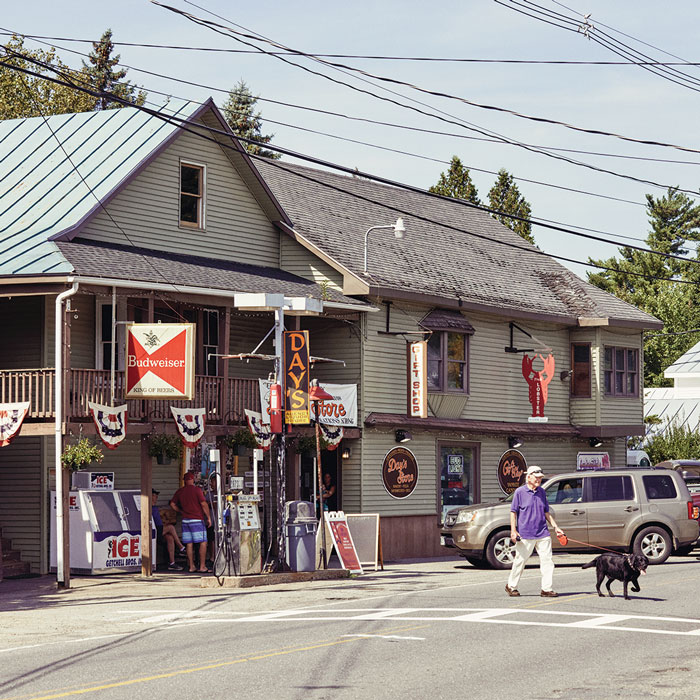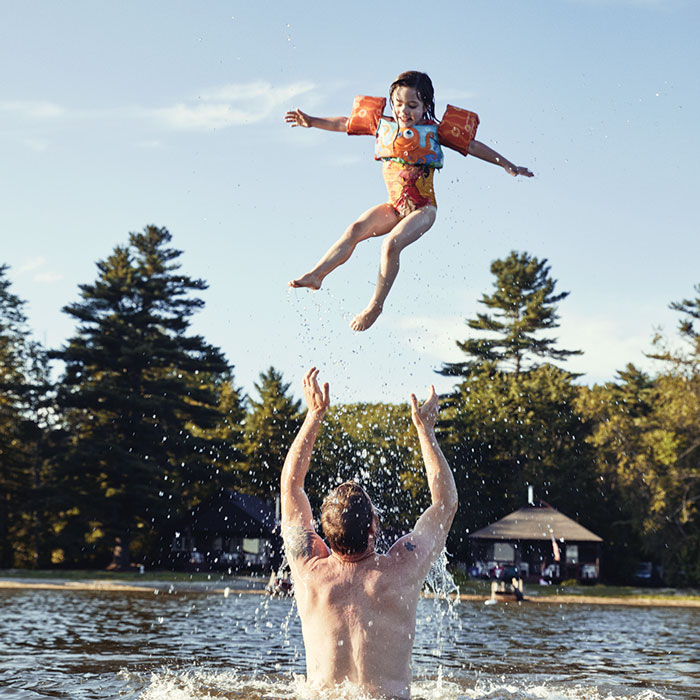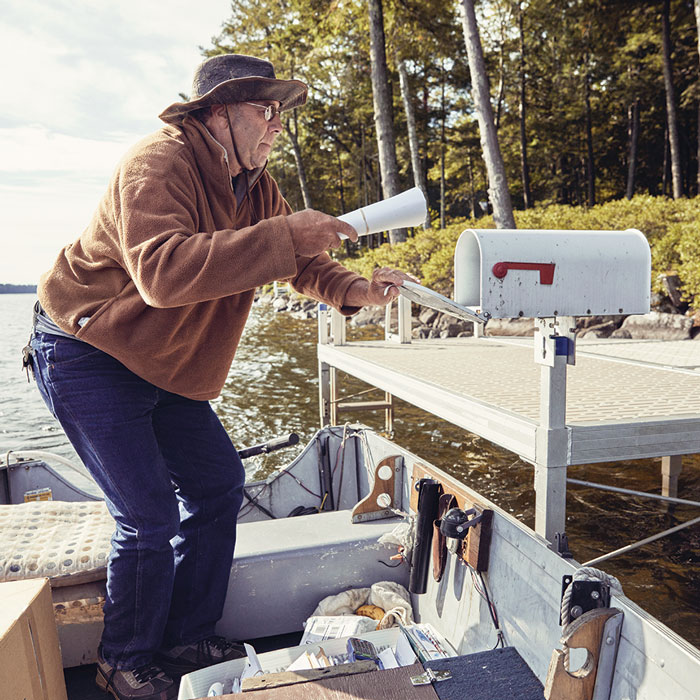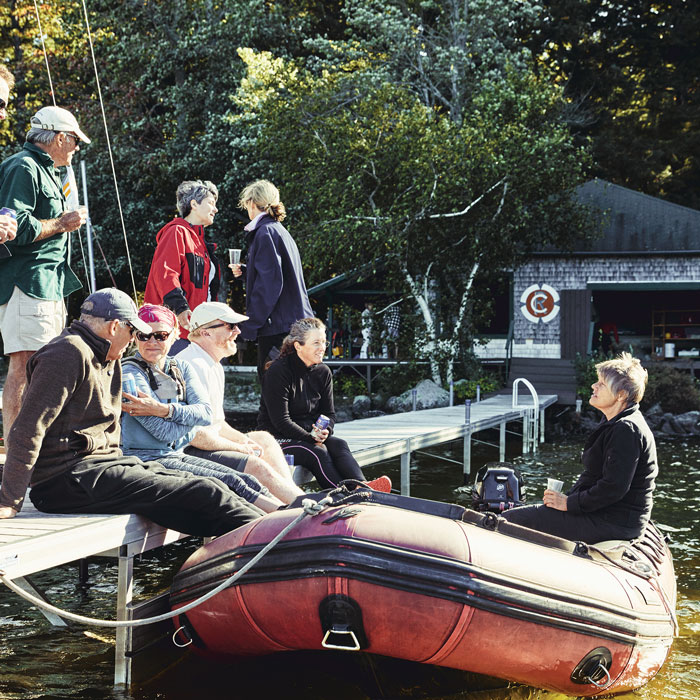ONCE MORE
THE
From our June 2019 issue
I fire up the boat and we’re off. Five minutes in, as we pass between the green and red buoys in the channel, we spot a great blue heron taking wing, and I cut the engine. We float there in silence for a moment, my wife and I, watching that beautiful, awkward bird fly past. Mist rises off the water. Loons call across the lake, one to another: the female shrieking maniacally, the male answering, a melancholy hoo.
Deedie and I have lived here, in Rome, in the Belgrade Lakes region of central Maine, for almost 30 years now. The Belgrade Lakes chain consists of seven ponds, each with its own character. The biggest is Great Pond — over 8,000 acres and abundant with brown trout, brook trout, landlocked salmon, white perch, and pickerel. Messalonskee Lake — known by Belgravians as Snow Pond — is 3,500 acres; you can find some good northern pike there. Then there’s North Pond and East Pond, Long and Salmon and McGrath: each with its own unique history, each connected to another by tiny streams. But those streams connect more than the lakes. On a good day, they connect the individuals who live here too.
It was on Great Pond that E. B. White spent boyhood summers, at Bear Spring Camps. His classic essay “Once More to the Lake” is about Belgrade. Here he is, singing the pleasures of fishing in early morning and remembering fishing in the same place as a child: “I felt the same damp moss covering the worms in the bait can, and saw the dragonfly alight on the tip of my rod as it hovered a few inches from the surface of the water. It was the arrival of this fly that convinced me beyond any doubt that everything was as it always had been, that the years were a mirage and there had been no years.”
There are moments, living in Belgrade Lakes, when things still feel this way. I look out my window and see fishermen drifting past in their boats. Sometimes I swear they are the same guys I saw drifting past on a similar morning, some 30 years ago now, when we first looked out on these waters.


The lake my wife and I live on, Long Pond, is divided into a northern and a southern half, connected by a channel. In the middle of the channel sits rustic, adorable Castle Island, home since 1929 to a classic fishing camp. When I first moved here, there really was a Horatio Castle running the place. These days, Castle Island Camps is run by the Rice Family, John and Rhonda and their daughters. But in most ways, it is unchanged since the old days: The dozen-odd cabins are still centered around the main lodge, where visitors gather around the stone fireplace. Yes, there is a moose head on the wall. No, there is no television.
The southern end of Long Pond narrows to a lovely stream, this one connecting to Messalonskee Lake. At the other end, the northern tip is fed by Whittier Brook, which comes down out of the Kennebec Highlands and makes a merry, clear sound as it rushes over granite boulders. Some people say the fishing is better in the southern half of the lake — Horatio Castle used to tell people how to find “Lucky Point” and its legendary “salmon hole” — but it’s the northern half, which my wife and I are crossing this morning, where you’ll find the village of Belgrade Lakes, a small collection of buildings on a finger of land between Long and Great Ponds.
Today, we’re off to the summer farmer’s market. On another visit, we might drop in on one of the town’s two longest-tenured restaurants: the homey Sunset Grill or the stone-cold classic Village Inn and Tavern, known for its slow-roasted duck. The Village Inn is flanked by a pair of docks — one for folks coming from Long Pond, another for visitors from Great Pond, by way of a connecting stream. There are a lot of things I love about this town, but going out to dinner by boat, tying up at a dock in front of the Village Inn — how great is that?
First row: Aboard Junebug on Great Pond; sisters Shari Hamilton, Margaret Bartel, and Vena Hamilton at owner Shari’s Hello, Good Pie Bakery & Gourmet Kitchen; cabins at Bear Spring Camps. Second row: Day’s Store, in the heart of Belgrade Lakes; lounging near Great Pond Marina; splashing at Bear Spring Camps.
Aboard Junebug on Great Pond; sisters Shari Hamilton, Margaret Bartel, and Vena Hamilton at owner Shari’s Hello, Good Pie Bakery & Gourmet Kitchen; cabins at Bear Spring Camps; Day’s Store, in the heart of Belgrade Lakes; lounging near Great Pond Marina; splashing at Bear Spring Camps.
Then there’s Day’s Store, Belgrade Lakes’ unofficial town hall, which has its own set of docks on the Long Pond side. Day’s has been run by the same family since 1958 — it’s now on its fourth generation. This is the place for homemade doughnuts and coffee, for your copy of the Kennebec Journal or a six-pack of Sea Dog, for corn on the cob, lobsters, fudge, or a fishing net. There’s a sign out front, proclaiming the hours: “Summer: NEARLY ALL OF THEM. Winter: DAMN FEW.”
Our town has been a tourist destination since the 1920s. Once, the majestic Belgrade Hotel stood on a small bluff on Long Pond. Summer people from New York and Philadelphia used to come off the steam train to Belgrade Depot — now a Hammond Lumber yard — then settle into the massive inn for the summer. It was an old-school grand hotel, built in 1900, with 75 rooms, gardens, a golf course. But the inn burned to the ground in 1956, putting an end to that era — although some folks will tell you the era had already ended a decade earlier, after the war, when cars replaced trains and small cabins succeeded grand hotels as the vacation options of choice.
Golf continues here, anyway — boy, does it ever. Built by entrepreneur and philanthropist Harold Alfond in the mid-1990s, the course at the Belgrade Lakes Golf Club is a showstopper, designed by architect Clive Clark to stretch across a dramatic ridge. Alfond said he wanted to build “a country club for the average guy.” I don’t golf, but the course’s 360-degree views of the lakes make me wish I did.
Life in Belgrade has a seasonal rhythm to it. The ice disappears by mid-April, and the fishermen arrive soon after. In summer, it can be crowded, the golf pilgrims wandering town before their tee times, the lakes filling up with bass boats and water skiers and the dreaded Jet Skis. Things thin out again as the colors change. By late fall, Day’s is on reduced hours; the Village Inn closes after Thanksgiving.
First row: Lunchtime in the lodge at Castle Island Camps; guest Ryan Saucier tosses his daughter at Bear Spring Camps; sailboat in the Commodore’s Cup regatta on Great Pond. Second row: Liberty, a 23-foot wooden cabin cruiser on Great Pond; roast duck at the Village Inn and Tavern. Third row: On the dock at Bear Spring Camps; mail carrier John Govostes delivers mail by boat on Great Pond; boat racers on the dock at Great Pond’s Camp Runioa, one of the Belgrade Lakes’ many summer camps, following a summer regatta.
In the lodge at Castle Island Camps; guest Ryan Saucier tosses his daughter at Bear Spring Camps; sailboat in the Commodore’s Cup regatta on Great Pond; Liberty, a 23-foot wooden cabin cruiser on Great Pond; roast duck at the Village Inn and Tavern; on the dock at Bear Spring Camps; mail carrier John Govostes delivers mail by boat on Great Pond; boat racers on the dock at Great Pond’s Camp Runioa, one of the Belgrade Lakes’ many summer camps, following a summer regatta.
Then it’s cold and quiet, and our days are punctuated by the sound of snowplows rumbling past in the middle of the night. We see snowshoers and cross-country skiers on the mountain paths and on some of the lakes, alongside the shacks of ice fishermen. The “Christmas Stroll” in town is the last celebration before we all turn inward for deep winter. Sometimes, that’s my favorite part of the year — the house warmed by woodstoves, dogs lying on the floor in front of the fireplace, the sound of a neighbor chopping kindling. My wife likes to make stews and chilis and soups in winter; I like to bake hearty loaves of bread — whole wheat, or rye, or pumpernickel brown with molasses. We sit in front of the fire on those long winter nights and drink a cocktail and eat Irish stew from handle bowls and play Scrabble. My wife beats me nearly every time; after 30 years, it no longer surprises me when she makes BLOOPIER on a triple.
Sometimes, in late spring, I’ll get a phone call from someone down south, a friend whose tulips are already out while Deedie and I are still socked in. They always say they’re sorry for us at those times, those friends of mine. I just sit there in the warmth of the fire with our dogs and act like I’m grateful for their pity. But to be honest, I wouldn’t trade places for the world.
In 2003, I got to see what this town was made of when I came out as transgender and published a bestselling book about that transition, called She’s Not There. If you would expect people in a small town in Maine to be close-minded and cruel about LGBTQ issues, you would be wrong. Mostly, my wife and I got to see how good people could be. Again and again, we heard variations on one generous refrain: Well, you’ve always been our neighbor. We will have your back.
The lakes have always been a good place for artists and writers, free spirits and iconoclasts. A century ago, the Maine Chance Spa, run by Elizabeth Arden, provided a respite for all sorts of women who needed a little solace. Judy Garland, Ava Gardner, Edna Ferber, and Lillian Gish were among its visitors. Today, the Arden Estate has been transformed by celebrated hero Travis Mills into a center supporting wounded American veterans.


Ernest Thompson wrote On Golden Pond during Memorial Day weekend at his Great Pond camp in 1978, and his play — as well as the film adaptation — captures what life in Belgrade used to be like (and sometimes still is). Thompson has said that his play is about families who used to spend whole summers at the lake, as he did as a child, in places where there was no television or phone. The Thompson cottage, instead, was filled with books. Now 68, Thompson has continued to visit Great Pond all his life.
As our boat makes its way toward the village, Deedie and I see a lot of summer cottages, some of them surely unchanged, or nearly so, from the youths of Ernest Thompson or of E. B. White. And yet there are newer houses too: summer homes without basements, as well as full-season lodges overlooking the water.
We arrive at the dock, and Deedie and I step onto the bank in front of the Village Inn. Two doors down is the headquarters of the 7 Lakes Alliance, a nonprofit focused on environmental conservation in Belgrade. Among other things, the group leads efforts to combat nutrient pollution and invasives in the Belgrade Lakes, helping educate homeowners on how to be better stewards of the lakes and of this precious, fragile region. The group also hosts the Sunday farmer’s market in the side yard of its headquarters. Today, we’ll buy some quiche from Hello, Good Pie and maybe some sausages and ice cream and coffee. There will likely be someone there picking a banjo. I know I’ll see at least a few faces that I’ve known for over 30 years now. We’ve all seen changes in each other, and in this town, but there are constants as well — the love we have for each other, the love we have for this place.
Before we step off the dock and into town, my wife and I pause and look back in the direction from which we’ve come. There in the distance is Vienna Mountain, atop which is a blueberry farm, and the trees and trails of the Kennebec Highlands, the Maine reserve lands I sometimes explore with my mountain bike. There are loons and herons on the lake and red-winged blackbirds flitting among the trees.
And there, on the far bank, almost invisible to me now, is our home. Music calls to us from the market in the village. My wife and I join hands.


















